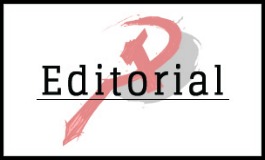
2014: Forge an Alternative Trajectory
People’s Democracy wishes its readers a very happy new year as we move into 2014.Such greetings are usually accompanied by the hopes that the new year will turn out to be better than what we all had to go through in 2013. We have often in these columns invoked Lord Tennyson’s famous line “Ringing out the old, ringing in the new.” Such hopes continue to remain and “the new,” we expect, will be for the better. Experience, however, teaches us that life is, more often than not, a continuum. This notwithstanding, indeed, some seminal achievements have been consigned to history in 2013 like the iconic Telegram and the canned film reel, with Bollywood announcing that its latest offering Dhoom 3 was released entirely in the digital format. No longer will we see the sheer poetry of Sachin Tendulkar’s batting in Test Cricket. There are many such developments that would merit a listing in such a category. We shall, however, leave this task to the chroniclers of history.
2013 is ending with the AAP forming the government in Delhi. We congratulate them and wish them all success. However, the government has begun to start working in 2014. Indian democracy has had many other instances when a new born party swept the elections like the Telugu Desam Party under N T Rama Rao. The continuation and sustainability of such parties have crucially depended on the policies and programmes that they have pursued. So shall be the case with the AAP government in Delhi. Hopefully, 2014 will see the articulation of the AAP’s policies and programmes with regard to the neo-liberal economic reforms that continue to heap miseries on the people and communalism that grievously threatens the very secular democratic foundations of modern India.
At another level, the economic hardships imposed on the vast majority of our people during 2013 threatened to intensify in 2014 unless, of course, there is a radical shift in the policy trajectory in the country. The year begins when the negative impact of another round of administrative fuel price hikes will be felt by the people. By now it has become common place to attribute the growing economic burdens on the people to the global crisis. The global economic crisis, however, appears all set to continue. Notwithstanding the fits and burst of hopes and recovery in 2013, world economy continued to falter and stagger. India, which withstood the devastating impact of the 2008 global financial meltdown, has now become vulnerable and is buckling down under this impact. This can only be reversed if the unbridled economic reforms that place Indian resources and markets at the disposal of profit maximization to foreign and domestic capital are reversed and our own resources are marshalled for our domestic economic growth and improved welfare of our people.
However, people perceive little difference between the Congress and the BJP as far as the economic policies or corruption is particularly concerned. That there is little difference between the two is confirmed by parliamentary experience. Often, on issues of corruption like the 2G spectrum or the coal block allocation scams, in-depth discussion was disrupted lest skeletons stumble out of the previous Vajpayee-led NDA government’s cupboards as well. This led to credible allegations of ‘match-fixing.’ On the score of neo-liberal economic policies, whether on measures like permitting FDI in pension funds jeopardising the economic security of crores of employees or undoing bank nationalisation through privatisation and permitting foreign financial institution’s unfettered entry thus making India vulnerable to international financial speculation, the Congress and BJP were on the same side.
2014 provides an opportunity for such a shift in the policy trajectory in the country. The forthcoming general elections must serve as the opportunity to bring about such a change not merely in the ruling party but in terms of alternative policies. The Indian people, if they want to change the situation for the better, will have to use this opportunity provided by the general elections to bring about a political alternative that is capable of implementing alternative policies.
An alternative policy trajectory that ensures universal rights and not entitlements (smacking of charity) to food security; free health care; universal free education; right to employment or adequate unemployment allowance; and universal schemes for the care of the elderly and differently abled, at least, must form the core of such an alternative. This trajectory is preferable not only in humanitarian terms but makes eminent economic sense as well. By thus empowering the people, their purchasing power will substantially increase generating the much-needed additional aggregate domestic demand which, in turn, will provide the impetus for manufacturing growth and, hence, employment. This would set in chain a motion of sustainable and more equitable growth trajectory.
That there are resources to sustain such a strategy is obvious if the humongous corruption scams are prevented and the massive tax concessions to the rich are instead used for public investments to build our much needed infrastructure generating substantial new employment. What the country needs is a political alternative that can put in place such an alternative policy trajectory.
Thus what we need is not merely an electoral alternative but a policy alternative. India awaits such a Left, democratic and secular alternative in 2014.
Greeting this New Year means that we strengthen the people’s struggles powerfully enough to ensure that such an alternative is put in place in 2014 following the general elections.
Best wishes once again for a year ahead that shall resonate in history as one where powerful people’s movements and struggles succeed in changing the policy trajectory in our country while, at the same time, resoundingly defeating the communal forces and, thus, safeguarding our secular-democratic foundations. This is the essential pre-requisite to create a better India and a better quality of life for our people.
(January 02, 2014)


